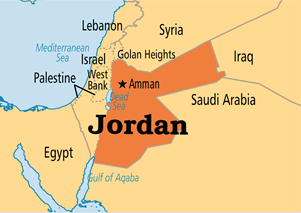JULY 29- TODAY’S READING FROM THE ONE YEAR BIBLE- 2 CHRONICLES 24:1-25:28; ROMANS 12:1-21; PSALM 22:19-31; PROVERBS 20:8-10
TODAY’S READING FROM THE OLD TESTAMENT- 2 CHRONICLES 24:1-25:28
 Remember the overarching theme of 1 and 2 Chronicles. The writer has compiled the history of the kings of Judah and is examining each one who comes to the throne in the light of the Davidic covenant promise. How do these kings measure up to the promised Son of David who would establish a ‘forever’ kingdom in righteousness?
Remember the overarching theme of 1 and 2 Chronicles. The writer has compiled the history of the kings of Judah and is examining each one who comes to the throne in the light of the Davidic covenant promise. How do these kings measure up to the promised Son of David who would establish a ‘forever’ kingdom in righteousness?
This book is compiled after the Babylonian captivity, and therefore recognizes the failure of all the kings of Judah to fulfill the promise of the Davidic covenant. The history of Judah’s kings is recorded to reestablish the hope of a future kingdom and encourage the remnant that returns from captivity to rebuild the temple in Jerusalem. After the captivity, there are no more kings of Judah reigning on the throne until the One comes who is ‘born king’ (Matthew 2:2). In the fullness of time God sent forth His Son, born of a woman, born under the Law (Galatians 4:4) who was descended from David, Jesus of Nazareth. He came to His own, but His own receive Him not. He lives, dies, and is raised as the King of the Jews. He ascends to the right hand of the Father where He reigns as King of kings and Lord of lords and promises to return to reign upon the earth. Now, to as many as receive Him, to them He gives the legal right to be adopted as joint-heirs with Christ in His eternal kingdom (John 1:11-12). This adoption by the new birth into God’s family is not due to any merit of family lineage (‘not of blood’), or any deservedness through human performance (‘the will of the flesh’) nor of human initiative (‘the will of man’), but of God. It is a miracle of grace!
 In 1 Chronicles, the kings of the northern kingdom are only referred to as they relate to the kings of the southern kingdom of Judah. The chronicler is also tracking the condition of the temple.
In 1 Chronicles, the kings of the northern kingdom are only referred to as they relate to the kings of the southern kingdom of Judah. The chronicler is also tracking the condition of the temple.
There are many spiritual lessons here for all servants of the King of Kings who have an interest in serving His purposes for His pleasure.
In the failure of Judah’s kings, we see the truth of human depravity, the incurable deceitfulness of the human heart (Jer 17:11). Even those who get rid of idols, carefully repair the temple, and restore the true worship of Yahweh, are guilty of moral compromise, unholy alliances, pride, and presumption.
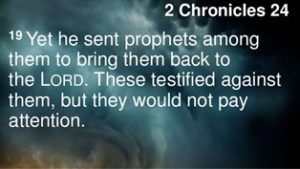 As human beings, we are not fully aware of the influences we are subjected to. Satan can be behind the idea of numbering the troops (as in David’s case). A new love interest can be a calling card for demonically inspired idol worship (as in Solomon’s case). We can become proud, forsake the counsel of elders, and give in to the flattery of our peers who encourage the selfish ‘might makes right’ trajectory of Rehoboam. We can stand up to the sins of Jeroboam and his false worship system and still be influenced towards disobedience. We can compromise allegiance to God by attempting to gain political power through ungodly means (multiplying wives as in Abijah’s case). We can profess faith in God, destroy the altars of the idolaters, but be influenced by the prevailing culture. We live as practical atheists when we make decisions about whether to trust God or the king of Syria for military victory or go to occult physicians before going to God first in prayer for health (as was the case with Asa). Jehoshaphat can call the southern kingdom to penitent prayer and fasting, which strategically ushers in a major victory over the enemy (2 Chron 20), but he compromises the future security and spiritual well-being of the kingdom with continued unholy alliances with King Ahab and the apostate northern kingdom of Israel, even to the extent of permitting his son, Jehoram, to marry Ahab’s wicked daughter, Athaliah. When Jehoram comes to the throne, through the influences of his wife, the sins of the northern kingdom infiltrate the southern kingdom to the degree that Baal and Asherah worship come to the temple in Jerusalem. Jehoram attempts to make his throne secure by murdering his brothers. The people of Judah follow his practice of spiritual fornication. Elijah the prophet writes to Jehoram a letter promising God’s judgment of a painful death (2 Chron 21:12-15). Although the people gladly followed Jehoram’s leadership away from the ways of the Lord into gross sin and idolatry, none of the people regretted his death (21:20).
As human beings, we are not fully aware of the influences we are subjected to. Satan can be behind the idea of numbering the troops (as in David’s case). A new love interest can be a calling card for demonically inspired idol worship (as in Solomon’s case). We can become proud, forsake the counsel of elders, and give in to the flattery of our peers who encourage the selfish ‘might makes right’ trajectory of Rehoboam. We can stand up to the sins of Jeroboam and his false worship system and still be influenced towards disobedience. We can compromise allegiance to God by attempting to gain political power through ungodly means (multiplying wives as in Abijah’s case). We can profess faith in God, destroy the altars of the idolaters, but be influenced by the prevailing culture. We live as practical atheists when we make decisions about whether to trust God or the king of Syria for military victory or go to occult physicians before going to God first in prayer for health (as was the case with Asa). Jehoshaphat can call the southern kingdom to penitent prayer and fasting, which strategically ushers in a major victory over the enemy (2 Chron 20), but he compromises the future security and spiritual well-being of the kingdom with continued unholy alliances with King Ahab and the apostate northern kingdom of Israel, even to the extent of permitting his son, Jehoram, to marry Ahab’s wicked daughter, Athaliah. When Jehoram comes to the throne, through the influences of his wife, the sins of the northern kingdom infiltrate the southern kingdom to the degree that Baal and Asherah worship come to the temple in Jerusalem. Jehoram attempts to make his throne secure by murdering his brothers. The people of Judah follow his practice of spiritual fornication. Elijah the prophet writes to Jehoram a letter promising God’s judgment of a painful death (2 Chron 21:12-15). Although the people gladly followed Jehoram’s leadership away from the ways of the Lord into gross sin and idolatry, none of the people regretted his death (21:20).
We learned yesterday about Ahaziah, the youngest son of Jehoram. He reigned for one year only, during which he was completely under the evil influence of his mother, Athaliah, the widow of Jehoram and daughter of Ahab. After Ahaziah is wounded in battle, he is killed by Jehu. “There was no one in the house of Ahaziah powerful enough to retain the kingdom” (22:9). Therefore Athaliah, the daughter of the wicked king Ahab of Israel, becomes the one and only Queen in the history of Judah.
Athaliah does everything in her own power to secure her position. She slaughters, or so she thinks, the whole royal family of the house of Judah.
Jehoiada, a prominent priest, and his wife, Jehosheba, daughter of King Jehoram, and sister of Ahaziah, successfully rescued their infant nephew, Joash, son of Ahaziah. They stow him away in the temple, while Athaliah went on her rampage, killing all the male Davidic heirs to the throne. They patiently nurture him for six years under the shelter of the Temple.
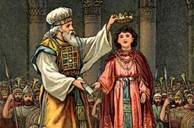 Jehoiada boldly brings Joash out to be anointed as king at the age of 7, under the protection of the Levites and the military. When Athaliah hears the people cheering at the young child’s coronation, she shouts, “Treason! Treason!” not aware of her own treason against the God who created heaven and earth, the true King of the nation. Jehoiada orders her death.
Jehoiada boldly brings Joash out to be anointed as king at the age of 7, under the protection of the Levites and the military. When Athaliah hears the people cheering at the young child’s coronation, she shouts, “Treason! Treason!” not aware of her own treason against the God who created heaven and earth, the true King of the nation. Jehoiada orders her death.
Joash does what is right in the eyes of the Lord during the days of Jehoiada. Jehoiada was a godly but unappreciated influence in Joash’s life.
Joash recognizes the need to repair the temple in Jerusalem. Athaliah’s children had desecrated it, using its sacred objects for the worship of Baal.
 The king commanded the Levites to implement the temple tax required by the law of Moses and to raise funds for the repair of the temple. The goal was to restore the temple to its original purpose and design. The work of Christ as He builds His church to be His dwelling place through the Spirit is purposed to restore humanity to its original design.
The king commanded the Levites to implement the temple tax required by the law of Moses and to raise funds for the repair of the temple. The goal was to restore the temple to its original purpose and design. The work of Christ as He builds His church to be His dwelling place through the Spirit is purposed to restore humanity to its original design.
Jehoiada dies at the age of 130. Without his godly influence, King Joash and the people turn away from the Lord and worship the Ugaritic mother-goddess, Asherah, and the idols of neighboring countries.
2 Chronicles 24:18 18 They abandoned the house of the LORD, the God of their fathers, and served the Asherim and the idols; so wrath came upon Judah and Jerusalem for this their guilt.
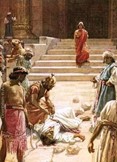 When Jehoiada’s son, the prophet Zechariah, pronounces judgment upon Joash and the people of Judah for their disobedience to the Lord’s commands, they stone Zechariah to death in the courtyard of the temple (2 Chronicles 24:21).
When Jehoiada’s son, the prophet Zechariah, pronounces judgment upon Joash and the people of Judah for their disobedience to the Lord’s commands, they stone Zechariah to death in the courtyard of the temple (2 Chronicles 24:21).
This prophet, Zechariah, is remembered by the Lord Jesus Christ, who indicted the Jewish leaders in Jerusalem, highlighting their track record of blood-guiltiness for murdering prophets.
Matthew 23:34-35 34 “Therefore, behold, I am sending you prophets and wise men and scribes; some of them you will kill and crucify, and some of them you will scourge in your synagogues, and persecute from city to city, 35 so that upon you may fall the guilt of all the righteous blood shed on earth, from the blood of righteous Abel to the blood of Zechariah, the son of Berechiah, whom you murdered between the temple and the altar.
Remember that Genesis is the first book in the Hebrew Bible, and 2 Chronicles is the last. Therefore Jesus is referencing the entire recorded history in the Old Testament (the Tanach) of martyrdoms of those who bore the testimony of having a right relationship with God through faith in the message of Christ.
TODAY’S THEME. Be aware of godly and ungodly influences in your life. Appreciate the good influences. Sadly, Joash, who survived the slaughter of his family members due to the faithfulness of Jehoiada and his wife, did not fully appreciate or even remember the personal sacrifice and godly nurture they had provided. Joash murders the son of the man who not only saved his life from death but had kept him on the right track for many years.
2 Chronicles 24:22 22 Thus Joash the king did not remember the kindness which his father Jehoiada had shown him, but he murdered his son. And as he died, he said, “May the LORD see and avenge!”
The Lord does bring judgment upon Joash. A small band of Syrians (Arameans) are able to plunder the city of Jerusalem, kill the leaders, and send the spoil to the king of Damascus. (2 Chronicles 24:23-25) Joash is left severely wounded. His officials conspired against him for killing Zechariah and murdered him in his bed (2 Chronicles 24:25).
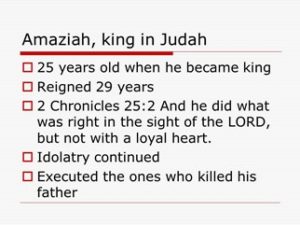 Joash’s son, Amaziah, at the age of 25, succeeds his father and reigns for 29 years.
Joash’s son, Amaziah, at the age of 25, succeeds his father and reigns for 29 years.
2 Chronicles 25:2 2 He did right in the sight of the LORD, yet not with a whole heart.
He unwisely hired 100,000 fighting men from Israel for a hundred talents of silver. When the prophet told Amaziah that these mercenaries must not march with them or they would be defeated, Amaziah complains about money wasted.
 2 Chronicles 25:9 9 Amaziah said to the man of God, “But what shall we do for the hundred talents which I have given to the troops of Israel?” And the man of God answered, “The LORD has much more to give you than this.”
2 Chronicles 25:9 9 Amaziah said to the man of God, “But what shall we do for the hundred talents which I have given to the troops of Israel?” And the man of God answered, “The LORD has much more to give you than this.”
We so easily rationalize our failure to do what God says because we fear that it will cost us. Believe me, disobedience is far more costly. And remember, “The Lord has much more to give you” than you stand to lose!
Amaziah submitted to the prophet, dismissed the hired troops, and was given the victory over the men of Seir. The dismissed Israelite troops are angry and kill 3000 people of Judea. Amaziah also brings back the idols from Seir and sets them up as his own gods. He brings back the gods of his defeated foes!
Another prophet confronts Amaziah’s idolatry and warns him of impending judgment. God’s punishment will follow with the defeat of Judah by Israel. When Amaziah asks to meet King Jehoash of Israel face to face in battle, he responds with a parable, warning him that his proud ambitions exceed his ability. Amaziah does not listen and is defeated when he faces Israel in battle. King Jehoash of Israel captures Amaziah king of Judah, destroys Jerusalem’s walls, and takes the gold and silver articles from the temple and palace treasures.
TODAY’S READING FROM THE NEW TESTAMENT – ROMANS 12:1-21
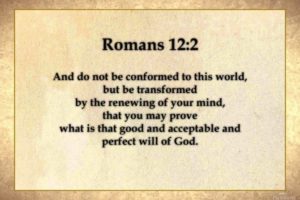 We come now to the practical application section of Paul’s letter to the Romans (Chapter 12-16). We are to live out the gospel with a renewed mind and harmonious relationships in the body of Christ. We need to have a humble mindset and a healthy self-assessment of our placement in the body of Christ in light of the gospel. Who are we in the body of Christ, and how are we to relate to one another? How do we serve together with God’s redeemed community in our locality (Romans 12:3-8)?
We come now to the practical application section of Paul’s letter to the Romans (Chapter 12-16). We are to live out the gospel with a renewed mind and harmonious relationships in the body of Christ. We need to have a humble mindset and a healthy self-assessment of our placement in the body of Christ in light of the gospel. Who are we in the body of Christ, and how are we to relate to one another? How do we serve together with God’s redeemed community in our locality (Romans 12:3-8)?
We might ask, what influences our decision-making today? We read in the Book of Romans, “Don’t let the world around you squeeze you into its own mold, but let God re-mold your minds from within, so that you may prove in practice that the plan of God for you is good, meets all his demands and moves towards the goal of true maturity.” (J. B. Phillips paraphrase of Romans 12:2).
 We are to live out the gospel in community. The apostle Paul informs us that the marks of a true Christian will be in the quality of their relationships with their brothers and sisters. This is also the message of the apostle John in his epistle.
We are to live out the gospel in community. The apostle Paul informs us that the marks of a true Christian will be in the quality of their relationships with their brothers and sisters. This is also the message of the apostle John in his epistle.
1 John 3:14 14 We know that we have passed out of death into life, because we love the brethren. He who does not love abides in death.
 Romans 12:9-13 9 Let love be without hypocrisy. Abhor what is evil; cling to what is good. 10 Be devoted to one another in brotherly love; give preference to one another in honor; 11 not lagging behind in diligence, fervent in spirit, serving the Lord; 12 rejoicing in hope, persevering in tribulation, devoted to prayer, 13 contributing to the needs of the saints, practicing hospitality.
Romans 12:9-13 9 Let love be without hypocrisy. Abhor what is evil; cling to what is good. 10 Be devoted to one another in brotherly love; give preference to one another in honor; 11 not lagging behind in diligence, fervent in spirit, serving the Lord; 12 rejoicing in hope, persevering in tribulation, devoted to prayer, 13 contributing to the needs of the saints, practicing hospitality.
How do we relate to those who wrong us? How do we deal with unbelievers who may persecute us? (v. 14-20)
We are not to retaliate in anger, but we are to leave room for the vengeance of God.
Do not be overcome by evil, but overcome evil with good (v.21)
Let us look for ways we can overcome evil with good today!
TODAY’S READING FROM THE BOOK OF PSALMS- PSALM 22:19-31
It has been said that in Psalm 22, the singer was singing better than he knew. While expressing his own experiences, he was voicing that which would be more fully experienced in our Savior’s suffering on the cross. We have insight as to the redeeming sufferings of the Son of God, the forsakenness (v.1-2), the identification with our fallen condition (v. 6a), the reproach he suffered in a world of unbelief (6b-9) for his implicit trust in God (v. 3-5).
We have insight as to his trust in God the Father from infancy (v.9-10), his suffering the onslaught of demonic oppression (v. 12-13), and his precise sufferings on the cross (v. 14-18).
He makes his prayer request to God, asking for help (v. 19-21). But with a heart full of praise, He has certain victory in view (v. 22-31). His travail leads to triumph!
As we read this Psalm, may we also share the Apostle Paul’s holy ambition:
Philippians 3:10-11 10 that I may know Him and the power of His resurrection, and the fellowship of His sufferings, being conformed to His death, 11 if, by any means, I may attain to the resurrection from the dead.
TODAY’S READING FROM THE BOOK OF PROVERBS- PROVERBS 20:8-10
Proverbs 20:8-10 8 A king who sits on the throne of justice disperses all evil with his eyes. 9 Who can say, “I have cleansed my heart, I am pure from my sin”? 10 Differing weights and differing measures, both of them are abominable to the LORD.
May we do what is pleasing to the eyes of Him who sits on the throne and not trust the faulty measures of doing what is right in our own eyes. Purify our hearts Lord, and give us the ability to discern and put away evil and injustice.
PRAY FOR THE NATIONS: (from Prayercast.com)
Jordan
Asia
As a land once marked with the footsteps of such men as Abraham, Job, Moses, and Jesus Christ, the Hashemite Kingdom of Jordan is rich with Biblical history. As a result, Christians consider areas of Jordan to be holy, although only two percent of the population identify themselves as followers of Christ. Muslims and Jews also believe in Jordan’s divine landscape, making the nation a crossroads of Holy Lands. Without the prevalence of oil found in most other Middle Eastern countries, the nation relies on tourism and foreign aid in order to offset a high budget deficit, and Jordan’s economy is the smallest in the Middle East.
Formerly known as the Transjordan, the nation has been ruled by a constitutional monarchy since 1952. This is exercised by a legal and judicial system using a mixture of civil law and Islamic religious law. The king uses the Prime Minister and the Council of Ministers to implement his executive power. The government relies heavily on foreign aid as a result of lacking natural resources, including water. Poverty and unemployment remain an issue as well.
Jordan is categorized as a restricted nation, where Christians are persecuted or oppressed as a result of government policy, and a staggering 14 of the 21 people groups in Jordan have not heard the Gospel. While Islam serves as the official religion, the constitution allows for religious freedom as long as Islamic law and public morality are not violated. Though legally protected, many new followers of Christ are pressured by the Muslim society and emigrate. This results in fewer people remaining to bear witness to the transforming power of the Gospel. While the churches within Jordan generally have good relations with each other, only about ten percent of house churches have meaningful relationships with Muslims. Media ministry is proving to be effective in this nation, specifically Christian satellite TV and radio broadcasts. Pray for the unreached to hear the Good News and be equipped to effectively minister to those around them.
- Pray for current religious freedom to remain despite increasing pressure to suppress it
- Pray for the multitude of refugees who have crossed into Jordan to clearly hear the true gospel.
- Pray for Christianity to be held in high regard so that God’s work in this strategic part of the Middle East would not be thwarted.
PRAYER: Father, we thank You for the great restoration work of Your Son, who pledged His life to the project of restoring our humanity to Your original design. May we truly bring glory to Your Name. We thank You for those men and women who provide a godly influence in our lives. We thank You for the ‘Jehoiadas’ in our life who spur us on in our quest to love and serve You with all our hearts. In light of the mercy of the perfect work that You accomplished for us, Lord Jesus, we present our bodies as a living sacrifice. You have brought us from death to life and now enable us to resist the pressure of being conformed to this world’s mold. But instead, enable us to be transformed through the renewing of our minds. Holy Spirit, take the Word we have read today and enable us to live it out, individually and in community. In Jesus’ Name. Amen.

